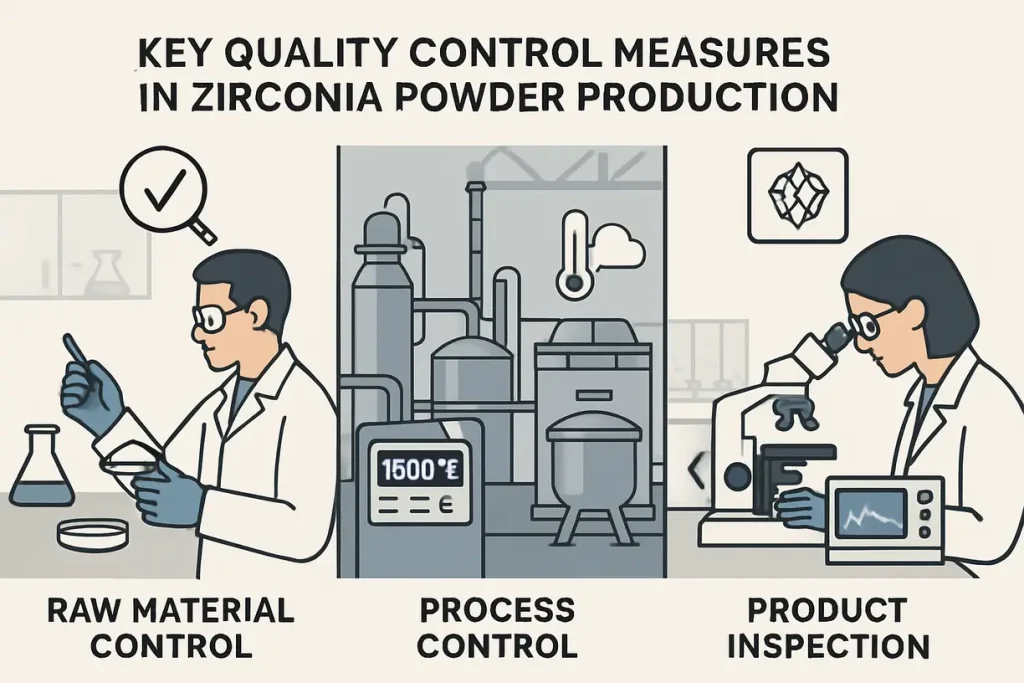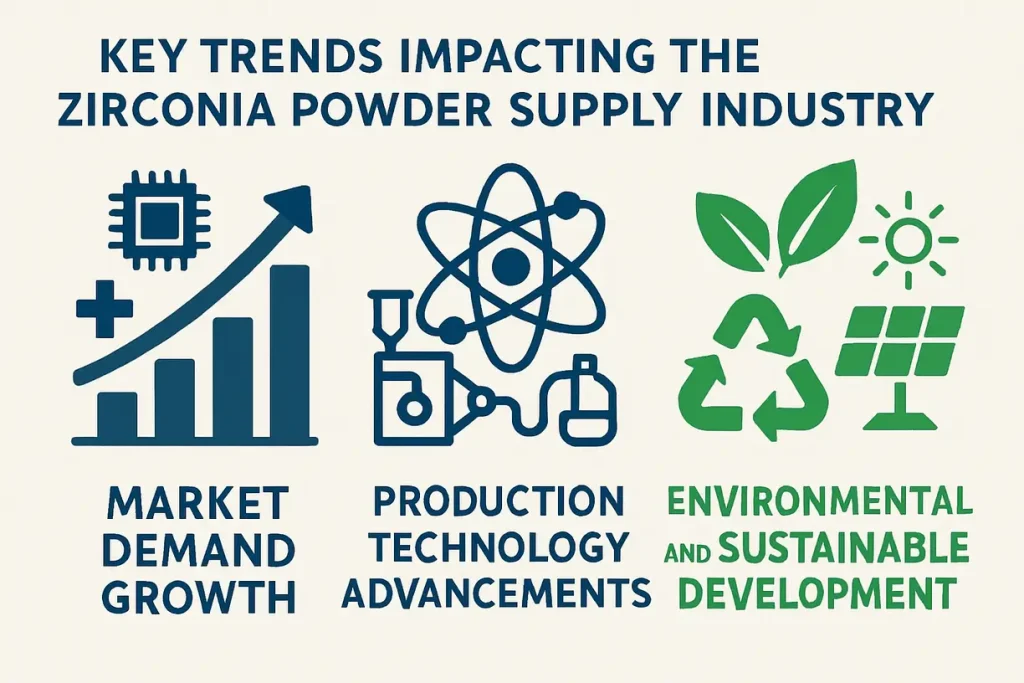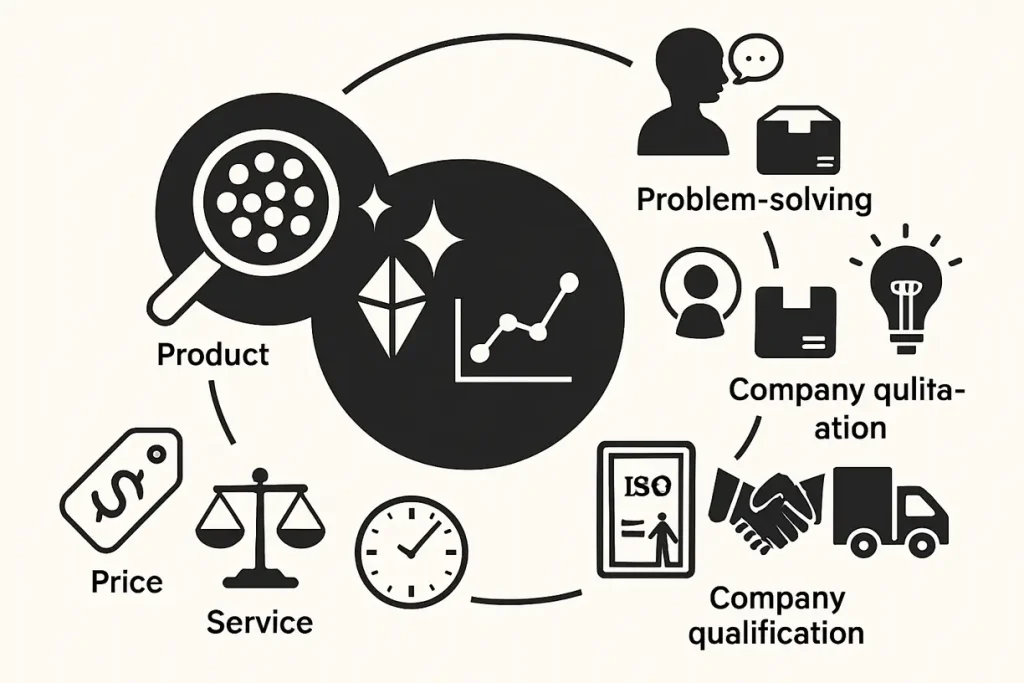The zirconia powder market is competitive, and decision-makers need to know how leading suppliers maintain their advantages. This article addresses concerns about supplier selection, outlines key factors contributing to success, and highlights strategies these suppliers use to stand out. By providing insights into the competitive landscape, readers will gain valuable knowledge to help improve their purchasing decisions.
As the market for zirconia powder continues to grow, understanding what differentiates the top suppliers becomes essential. This knowledge helps businesses make informed choices that directly impact their operations and overall success. Let’s begin by examining how zirconia powder suppliers achieve competitive advantages.
How Have Zirconia Powder Suppliers Achieved Competitive Advantages?
Zirconia powder suppliers navigate a complex market landscape. Their success hinges on several key factors. A clear understanding of market dynamics is critical. Leading suppliers study trends to anticipate changes in demand, allowing them to adapt swiftly.
Market position also plays a significant role. Companies that have established themselves over time leverage their reputation and customer loyalty. Recognizing their key players, such as those with strong production capabilities and innovative offerings, gives insight into how suppliers rise to the top.
Additionally, regular analysis of market challenges and opportunities helps suppliers maintain a competitive edge. In short, key advantages come from understanding the market, building strong relationships, and adapting to challenges.
| Competitive Advantage | Description |
|---|---|
| Market Understanding | Awareness of trends and demand fluctuations |
| Established Reputation | Trust built through long-term quality and reliability |
| Relationship Management | Strong ties with customers leading to loyalty |
| Adaptability | Quick responses to market changes |
What Factors Contribute to Supplier Success?
Success in supplying zirconia powder involves multiple factors. First, quality control is paramount. Top suppliers implement stringent quality checks throughout the manufacturing process to ensure consistency and performance.
Innovation in product development is another key element. Suppliers continuously invest in research and development to create new formulations or improve existing ones. This constant evolution satisfies customer requirements and keeps suppliers relevant in the market.
Moreover, supply chain efficiency significantly affects success. Suppliers who streamline their processes reduce costs and delivery times. They also ensure that they can meet customer demands promptly and reliably.
Ultimately, maintaining high standards in quality, driving innovation, and optimizing supply chains leads to success in this competitive field.
| Success Factor | Importance |
|---|---|
| Quality Control | Ensures product consistency |
| Innovation | Meets evolving customer needs |
| Supply Chain Efficiency | Reduces costs and delivery times |

This image shows various quality control measures implemented by leading zirconia powder suppliers.
Factors Influencing Supplier Success:
- Strong Leadership: Effective management that fosters a clear vision and drives the team’s performance.
- Skilled Workforce: Investment in training employees ensures high-quality output and innovation.
- Resource Management: Efficient use of resources minimizes waste and maximizes productivity.
- Customer Service Focus: Prioritizing customer satisfaction enhances long-term relationships and repeat business.
How Do Leading Suppliers Leverage Technology?
Technology plays a vital role in the competitiveness of zirconia powder suppliers. Automation in production is one way that suppliers enhance efficiency. Automated systems streamline operations, reduce manual errors, and improve output quality.
Additionally, advanced research and development are crucial. Leading suppliers invest in state-of-the-art technologies to explore new applications of zirconia powder. This commitment to innovation often results in unique offerings that serve various industries, such as ceramics, dental applications, and electronics.
Data analytics also helps suppliers understand customer needs better. By analyzing purchasing trends and market movements, they can make informed decisions about product development and inventory management. In summary, technology, through automation, R&D, and analytics, is a cornerstone of supplier success.
| Technology Leverage | Benefits |
|---|---|
| Automation | Increases production efficiency |
| Advanced R&D | Drives innovation and new product offerings |
| Data Analytics | Improves decision-making and market insights |
What Role Does Customer Relationship Management Play?
Effective customer relationship management is essential for zirconia suppliers. Building long-term partnerships with clients fosters trust and ensures repeat business. Suppliers dedicated to understanding their customers’ specific needs can better tailor their offerings.
Tailored solutions have become increasingly important. Suppliers who offer customized products often gain a significant advantage. Understanding industry-specific requirements helps them create products that stand out in the marketplace.
Furthermore, the importance of feedback cannot be overstated. Suppliers engaging in regular discussions with customers can identify areas for improvement and innovate accordingly. This approach strengthens relationships and enhances supplier reputation. Thus, prioritizing customer relationships leads to lasting success.
| CRM Strategies | Impact on Success |
|---|---|
| Partnership Building | Fosters loyalty and repeat business |
| Customized Solutions | Addresses specific industry needs |
| Feedback Loops | Drives continuous improvement and innovation |
Effective CRM Practices:
- Regular Check-ins: Consistent communication keeps suppliers informed about customer needs.
- Feedback Surveys: Gathering customer insights helps improve products and services.
- Personalized Support: Providing tailored assistance enhances customer satisfaction and loyalty.
How Can Suppliers Differentiate Themselves in a Crowded Market?
Differentiation is key in a competitive market. Suppliers focus on branding strategies that communicate their values and strengths. A strong brand identity resonates with customers and helps establish trust.
Unique selling propositions (USPs) are critical. Suppliers who highlight specific advantages—like unique formulations or superior customer service—can attract clients looking for more than just price.
Case studies of effective differentiation show how innovation and branding combine. For example, a supplier that introduced eco-friendly zirconia formulations attracted a niche market focused on sustainability, enhancing their competitive position. In this way, effective branding and USPs enable suppliers to thrive amidst competition.
| Differentiation Strategies | Examples |
|---|---|
| Strong Branding | Communicates values and strengthens trust |
| Unique Selling Propositions | Offers distinct reasons to choose a supplier |
| Case Studies | Demonstrates successful innovation in branding |
Unique Selling Propositions:
- Eco-Friendly Products: Offering environmentally friendly options caters to the sustainability-conscious market.
- Technical Support: Providing expert insights and assistance can enhance customer experience and satisfaction.
- Lower Lead Times: Quick delivery options attract customers looking for fast solutions.
What Are the Key Trends in Zirconia Powder Supply?
Understanding industry trends is crucial for suppliers. Current trends include an increasing focus on sustainability. Many suppliers are now implementing eco-friendly practices in production, making their products more attractive to environmentally conscious clients.
Another trend is the growth of applications across industries. Zirconia powder is seeing expanded use in sectors such as healthcare and electronics. As demand grows, suppliers must stay informed about how to tailor their offerings to meet these new challenges.
Responses to economic changes also represent a significant trend. Suppliers need to be prepared for fluctuations in raw material prices and industry demand. Adapting to these shifts efficiently can set leading suppliers apart from their competitors. In short, awareness of these trends allows suppliers to strategically align their operations and offerings.
| Trend | Description |
|---|---|
| Sustainability Focus | Increased production of eco-friendly products |
| Expanding Applications | Diverse uses in healthcare and electronics |
| Economic Adaptability | Preparedness for market fluctuations |

This image highlights current trends influencing the zirconia powder supply industry, focusing on sustainability and application growth.
Emerging Trends to Watch:
- Digital Transformation: Increasing reliance on digital tools improves operational efficiencies.
- Customization: Growing demand for tailored products to meet specific customer needs.
- Regulatory Compliance: Enhanced focus on meeting environmental and safety standards across industries.
How Do Suppliers Adapt to Regulatory Changes?
In a heavily regulated environment, adaptation is vital for suppliers. They must consistently monitor regulatory standards pertaining to zirconia powder. Understanding these requirements helps suppliers maintain compliance and avoid penalties.
Strategies for compliance are essential. Suppliers frequently engage in audits and assessments to ensure their processes align with industry regulations. This proactive approach can prevent future issues and reduce the risk of non-compliance.
The impact of regulations on market dynamics cannot be overlooked. Compliance can create barriers for new entrants and affect competitive positioning. Established suppliers who have navigated regulatory landscapes often strengthen their market share through proven reliability. Thus, ongoing regulatory awareness and compliance strategies are crucial.
| Regulatory Adaptation | Key Strategies |
|---|---|
| Monitoring Compliance | Staying updated with industry regulations |
| Proactive Engagement | Conducting regular audits and assessments |
| Impact on Market Dynamics | Understanding barriers for new entrants |
What Challenges Are Leading Suppliers Facing?
Top zirconia powder suppliers face various challenges. Supply chain disruptions, especially post-pandemic, remain a significant concern. Suppliers must remain agile in their sourcing and distribution to mitigate risks associated with delays or shortages.
Competition from emerging market players is also on the rise. New entrants with innovative solutions often disrupt traditional practices, prompting established suppliers to reconsider their strategies. This rising competition highlights the need for continuous improvement and adaptation.
Lastly, suppliers must manage the increasing costs associated with raw materials. Inflationary pressures can eat into margins, challenging pricing strategies. Suppliers who can efficiently manage their operations while delivering value will maintain their competitive edge. In summary, awareness of these challenges allows suppliers to strategically protect their positions in the market.
| Challenges | Strategies for Mitigation |
|---|---|
| Supply Chain Disruptions | Agility in sourcing and distribution |
| Competition from New Entrants | Continuous improvement and innovation |
| Rising Raw Material Costs | Efficient management of operations |
Challenges Faced by Zirconia Suppliers:
- Economic Uncertainty: Fluctuations in the economy can impact demand and pricing.
- Technological Change: Keeping up with rapid advancements can be resource-intensive.
- Customer Expectations: Meeting ever-evolving customer needs requires constant adaptation.
How Can Buyers Evaluate Zirconia Powder Suppliers?
Evaluating zirconia powder suppliers involves several criteria. One primary aspect is assessing production capabilities. Buyers must ensure that suppliers can meet quality standards consistently.
Considering third-party certifications is another key factor. Certifications provide assurance regarding quality and compliance. Buyers should work with suppliers who have relevant industry certifications, as this indicates a commitment to maintaining high standards.
Engaging in supplier audits and evaluations can further enhance understanding. These assessments help buyers gauge the reliability and quality of suppliers’ offerings. Ultimately, thorough evaluation processes empower buyers to make informed choices, ensuring their needs are met.
| Evaluation Criteria | Importance |
|---|---|
| Production Capabilities | Ensures suppliers meet quality standards |
| Third-Party Certifications | Confirms commitment to quality and compliance |
| Supplier Audits | Assesses reliability and performance |

This image depicts the criteria for evaluating zirconia powder suppliers, emphasizing quality and compliance.
Key Evaluation Criteria for Buyers:
- Response Time: Evaluate how quickly suppliers respond to inquiries and orders.
- Flexibility: Consider suppliers’ ability to adapt to changing demands or specifications.
- Technical Expertise: Assess the supplier’s knowledge and capacity for product innovation.
What Future Opportunities Exist for Zirconia Powder Suppliers?
Future opportunities for zirconia suppliers are expansive. Emerging markets present a significant growth potential. Suppliers who strategically enter these markets can benefit from rising demand for zirconia products.
Innovations driving demand are a key focus area. As technology advances, new applications for zirconia powder are likely to emerge. Suppliers must stay proactive in research and development to seize these opportunities.
Digitalization also represents a promising avenue. Incorporating digital tools can enhance customer engagement and streamline operations. Suppliers embracing these changes may find themselves better positioned for success. In summary, awareness of these future opportunities allows suppliers to strategically align their operations for growth.
| Future Opportunities | Description |
|---|---|
| Emerging Markets | Potential for increased demand and growth |
| Innovations | New applications leading to greater usage |
| Digitalization | Enhanced customer engagement and operational efficiency |
Conclusion
In conclusion, zirconia powder suppliers maintain their edge through a multifaceted approach encompassing quality, technology, customer relationships, and adaptability. By understanding industry dynamics and leveraging their strengths, these suppliers not only meet the needs of today’s market but also pave the way for future growth. One clear benefit readers gain is the ability to make data-driven purchasing decisions that set them up for success.
At Global Industry, we encourage you to explore partnerships with leading zirconia powder suppliers to enhance your operations. For further insights and tailored recommendations, connect with us to find the right fit for your business needs.
FAQ Section
Q1: What are the main competitive advantages of leading zirconia powder suppliers?
Top zirconia powder suppliers maintain their advantages through a combination of high-quality manufacturing processes, advanced technological innovations, and strong customer relationships. They also emphasize their ability to quickly adapt to market changes, utilize data analytics for informed decision-making, and invest in research and development, enabling them to offer unique formulations and solutions that stand out in the market.
Q2: How do technology and automation impact zirconia powder production?
Automation plays a crucial role in enhancing the efficiency of zirconia powder production. It streamlines various manufacturing processes, minimizing manual errors, and reducing production costs. Additionally, advanced technologies enable manufacturers to conduct precise quality control checks, improve product consistency, and innovate new applications for zirconia powder. This results in a faster turnaround time for orders and helps suppliers meet fluctuating customer demands more effectively.
Q3: Why is customer relationship management important for zirconia suppliers?
Customer relationship management (CRM) is vital for zirconia suppliers as it fosters long-term partnerships built on trust and loyalty. By prioritizing clear communication and understanding specific customer requirements, suppliers can tailor their offerings to better meet those needs. Effective CRM practices also include gathering feedback and addressing concerns promptly, leading to enhanced customer satisfaction and retention. Ultimately, strong relationships not only drive repeat business but also encourage new referrals and opportunities for growth.
Q4: What challenges do zirconia suppliers face in the current market?
Zirconia suppliers encounter various challenges, including supply chain disruptions that can affect material availability and lead to delays in production. Additionally, they must navigate increasing competition from emerging market entrants that bring innovative products to the table. Regulatory changes and compliance requirements can also pose challenges, requiring suppliers to adapt their processes continuously. Furthermore, rising costs associated with raw materials and economic fluctuations can strain their pricing strategies, necessitating effective cost management to maintain profitability.
Q5: How can buyers assess the capabilities of zirconia powder suppliers?
To thoroughly evaluate the capabilities of zirconia powder suppliers, buyers should consider several criteria. First, assess the production capabilities to ensure the supplier can consistently meet quality standards and production volumes. It’s also important to check for relevant third-party certifications, which indicate a commitment to quality and compliance with industry regulations. Conducting supplier audits can provide insights into reliability and operational efficiency. Additionally, buyers should examine the supplier’s responsiveness to inquiries and flexibility in addressing specific project requirements to ensure alignment with their operational goals.




